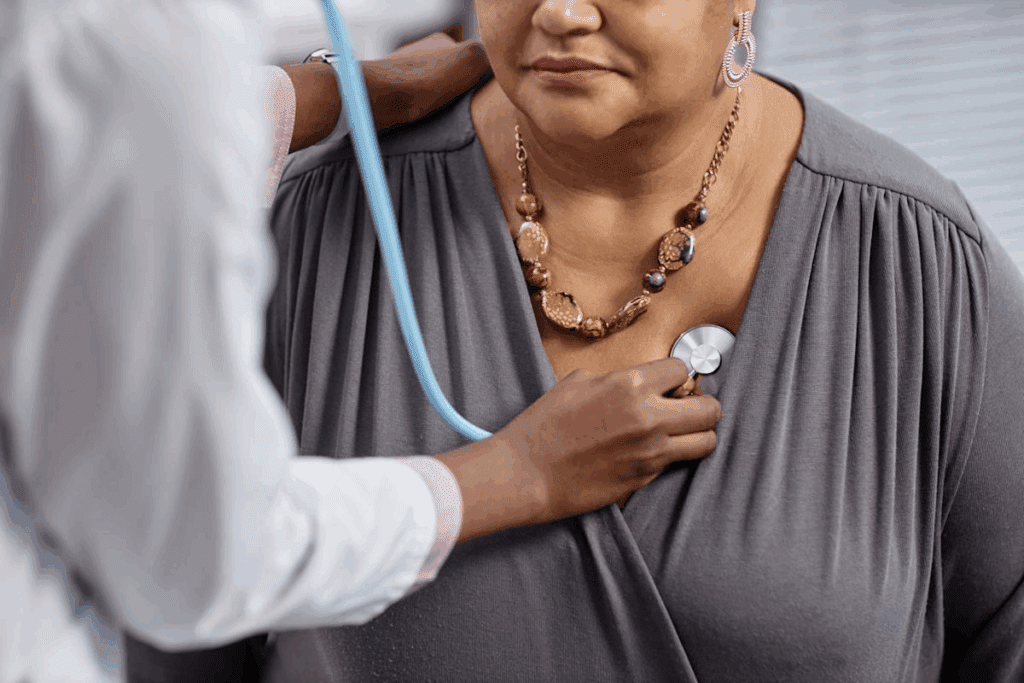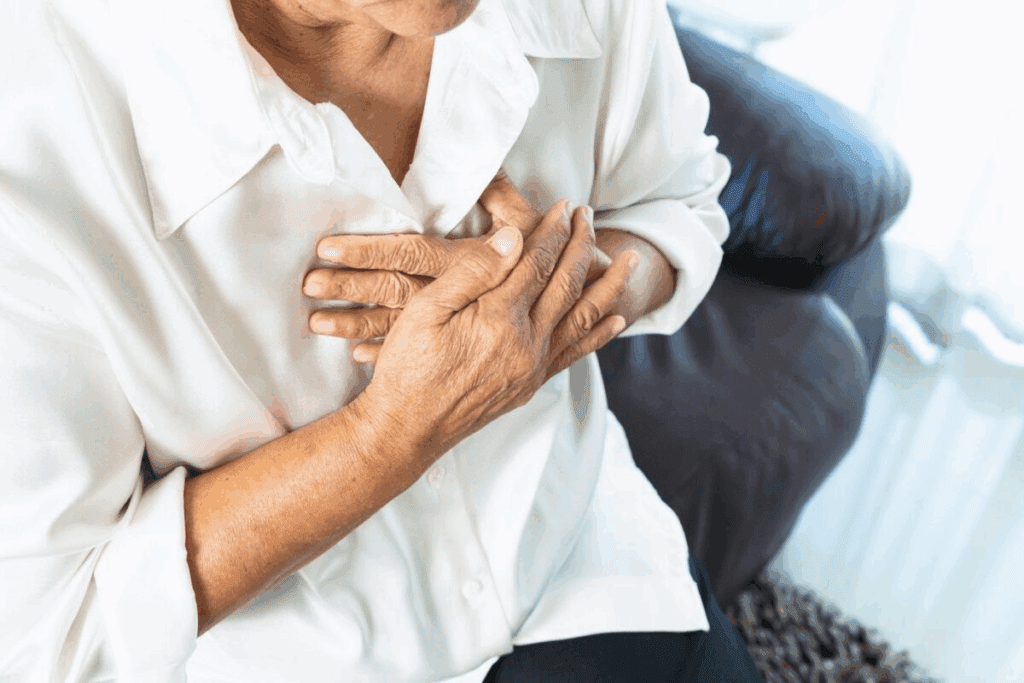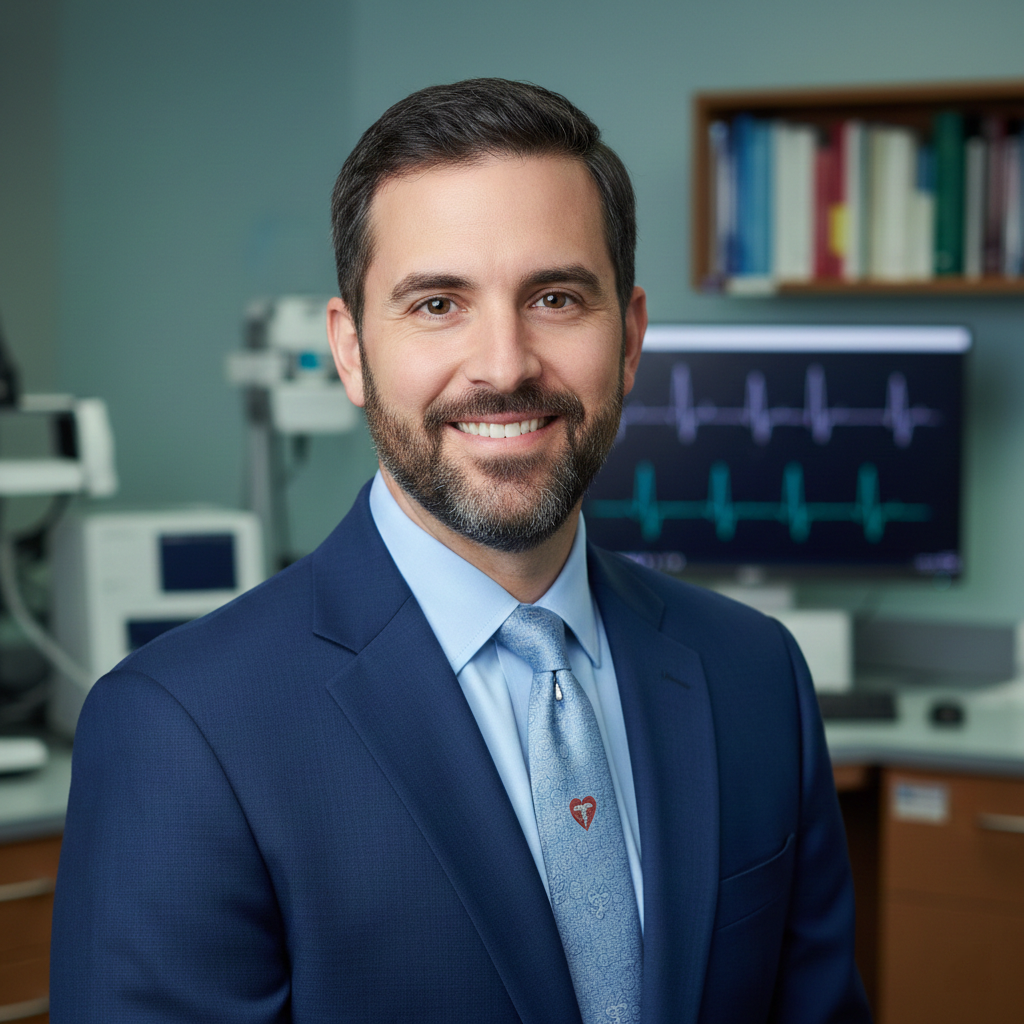
At Liv Hospital, we know that a silent myocardial infarction can be a big surprise. Up to 50 percent of heart attacks happen without the usual signs like severe chest pain.Find out can you have a heart attack and not know it and how to identify signs.
Many people don’t even know they’ve had a heart attack. It’s important to know the hidden signs to get help fast. We’ll show you the subtle signs your heart might be trying to tell you.
Key Takeaways
- Silent heart attacks can occur without noticeable symptoms.
- Up to 50 percent of heart attacks may be asymptomatic.
- Recognizing hidden signs is key for quick medical help.
- Liv Hospital offers top-notch diagnostics and care.
- Knowing the subtle signs can save lives.
Understanding Silent Heart Attacks: A Hidden Danger

Heart attacks don’t always show up like in the movies. Sometimes, they can be ‘silent’. A silent heart attack, also known as a silent myocardial infarction, happens when the heart muscle gets damaged without the usual chest pain and discomfort.
We often picture heart attacks as sudden and dramatic. But, the truth is, some heart attacks can be without symptoms or with mild signs that look like other health issues. It’s key to understand what makes a heart attack “silent” for our heart health.
What Makes a Heart Attack “Silent”?
A heart attack is called “silent” when it happens without clear symptoms or with mild signs like chest pain, fatigue, or shortness of breath. The American Heart Association says “a significant percentage of heart attacks are silent or unrecognized.” This makes it hard for people to know they’ve had a heart attack.
The Prevalence of Unrecognized Heart Attacks
Studies show that more heart attacks are silent or unrecognized than we think. Nearly 50% of heart attacks fall into this category. A researcher at the University of Virginia, notes in a study published in the journal Circulation,
“The presence of unrecognized MI [myocardial infarction] is associated with a significant increase in the risk of subsequent clinical cardiovascular events.”
This shows why it’s vital to know the risks and take steps to keep our heart healthy.
Learning about silent heart attacks and their risks can help us lower our risk and improve our heart health. Regular check-ups and paying attention to subtle signs can make a big difference.
Can You Have a Heart Attack and Not Know It?

It’s surprising to learn that you can have a heart attack without knowing it. This is called a silent myocardial infarction (MI). It happens when the heart muscle gets damaged because of a lack of blood flow. But, you might not feel any symptoms or they could be very mild.
The Science Behind Silent Myocardial Infarction
A silent heart attack happens when a blockage cuts off blood to part of the heart. This blockage is usually a blood clot on atherosclerosis (plaque) in a coronary artery. The reasons for a silent MI include the blockage size, where it is, how you feel pain, and your health.
Sometimes, the blockage is not complete, or the heart finds another way to get blood. People with diabetes or past heart damage might not feel pain as usual. This is because their nerves are affected.
Who Is Most at Risk for Unrecognized Heart Attacks
Some people are more likely to have a silent heart attack. Those with diabetes might not feel pain because of nerve damage. People with high blood pressure are also at risk. This is because high blood pressure can change blood vessels, leading to silent MIs.
Other risks include a family history of heart disease, being over 65, and having heart disease or past heart attacks. Knowing these risks helps you and your doctor watch your heart health more closely.
Knowing you’re not alone if you’ve had a silent heart attack is reassuring. Many people have heart attacks without realizing it. Being aware of the risks helps you take steps to keep your heart healthy.
Hidden Sign #1: Unusual Fatigue That Won’t Go Away
Feeling unusually tired can be a sign of a heart attack, even if you don’t think so. We often think of heart attacks as sudden and dramatic. But sometimes, the signs can be more subtle.
Fatigue is common and can have many causes, like not sleeping well or being stressed. But if you’re tired all the time and can’t shake it, it might mean something serious with your heart.
How Heart Attack Fatigue Differs from Normal Tiredness
Heart attack fatigue is not like regular tiredness. While normal tiredness goes away with rest, heart attack fatigue sticks around. It also often comes with other symptoms like breathing problems, feeling dizzy, or pain in the chest or arms.
Key differences between heart attack fatigue and normal tiredness:
| Characteristics | Heart Attack Fatigue | Normal Tiredness |
| Duration | Persists over time | Relieved by rest |
| Intensity | Severe and debilitating | Mild to moderate |
| Accompanying Symptoms | May include shortness of breath, dizziness, or pain | Usually none |
When Fatigue Warrants Medical Attention
If you’re tired all the time and can’t get better with rest, see a doctor. We suggest talking to a healthcare professional if you notice:
- Fatigue that lasts for more than a few days
- Fatigue that is severe and interferes with daily activities
- Fatigue accompanied by other symptoms such as chest pain, shortness of breath, or dizziness
It’s always better to err on the side of caution when it comes to your heart health. If you’re worried about your fatigue or notice any unusual symptoms, don’t hesitate to talk to a healthcare professional.
Hidden Sign #2: Mild or Vague Chest Discomfort
Mild or vague chest discomfort can be a sign of a heart attack. It’s not as well-known as severe chest pain. Yet, it can signal a problem with your heart.
Beyond the “Elephant on the Chest” Sensation
Many think of a heart attack as feeling like an “elephant on the chest.” But, not all heart attacks feel this way. Some people might feel mild pressure or discomfort instead of pain.
Characteristics of mild chest discomfort during a heart attack can include:
- A feeling of pressure or squeezing in the chest
- Mild pain that may radiate to the arm, neck, or jaw
- Discomfort that is intermittent or varies in intensity
Distinguishing Heart-Related Discomfort from Other Causes
Chest discomfort can have many causes, not just heart attacks. To know if it’s heart-related, look at these factors:
| Symptom | Heart-Related | Other Causes |
| Location of Discomfort | Central chest, may radiate to arm or jaw | Variable, often related to specific actions or positions |
| Nature of Discomfort | Pressure, squeezing, or tightness | Pain can be sharp, stabbing, or dull |
| Triggers and Relief | Often occurs at rest, not necessarily relieved by rest | May be triggered or relieved by specific actions or positions |
If you’re feeling mild or vague chest discomfort, it’s smart to see a doctor. They can check your symptoms, run tests, and give you the right treatment.
Hidden Sign #3: Upper Body Pain or Discomfort
Chest pain is a known heart attack symptom. But, upper body discomfort can also signal a problem. It’s important to know these signs to get help quickly.
Jaw, Neck, and Shoulder Pain as Heart Attack Indicators
Pain in the jaw, neck, or shoulder might mean a heart attack. This pain feels like a dull ache or pressure. It’s not always from physical activity or injury.
Jaw pain can seem like dental issues. Neck and shoulder pain might look like muscle strain. But, if the pain is severe or lasts, get medical help.
“The pain associated with a heart attack can radiate to the arms, back, neck, jaw, or stomach, making it important to look at all symptoms.”
Upper Back and Arm Discomfort: When to Worry
Discomfort in the upper back and arms can also signal a heart attack. The pain might feel sharp or dull. It can happen with or without chest pain.
Let’s look at how upper body pain relates to heart attacks:
| Area of Discomfort | Possible Heart Attack Indicator |
| Jaw Pain | Can be a referred pain from the heart |
| Neck and Shoulder Pain | May indicate cardiac-related strain |
| Upper Back Pain | Can be associated with cardiac issues |
| Arm Discomfort | Often radiates from the heart |
Knowing these signs can help you protect your heart. If you have unusual or ongoing upper body pain, see a doctor.
Hidden Sign #4: Digestive Symptoms Mistaken for Indigestion
Heart attacks can show up with unexpected symptoms like nausea and stomach pain. These are often thought to be just indigestion. This mistake can cause a delay in getting medical help, which is key in treating heart attacks.
Digestive symptoms can sometimes mean a heart attack is happening. Over 50% of heart attacks in both men and women show up as stomach pain. Symptoms can include nausea, heartburn, or feeling bloated.
Nausea, Heartburn, and Abdominal Discomfort
Nausea and vomiting are common signs of a heart attack. These are often seen as stomach problems, making it hard to quickly diagnose a heart attack. Heartburn and stomach pain can also be present, making diagnosis even harder.
These symptoms during a heart attack come from the body’s stress response. When the heart is under strain, it can affect digestion.
Why Heart Attacks Can Mimic Digestive Issues
Heart attacks can seem like stomach problems because of how the heart and stomach are connected. The nerves that supply both areas are linked, leading to similar symptoms.
The stress and discomfort of a heart attack can also make stomach symptoms worse. It’s important to think of a heart attack when someone has unexplained nausea, heartburn, or stomach pain.
To understand the link between heart attack symptoms and stomach problems, let’s look at this table:
| Symptom | Heart Attack | Digestive Issue |
| Nausea | Common, often accompanied by other symptoms | Frequent, may be related to food or eating |
| Abdominal Discomfort | Can occur, often with other signs like chest pain | Typical, may be relieved by antacids or food |
| Heartburn | Less common, but possible | Very common, often related to eating or position |
By knowing these differences and similarities, we can better spot when stomach symptoms might mean a heart attack.
Hidden Sign #5: Shortness of Breath Without Exertion
Feeling short of breath without trying hard can mean your heart needs help. This symptom, called dyspnea, can show up in many ways. It’s a sign that your heart or lungs might not be working right.
The Connection Between Breathing Difficulties and Heart Function
The heart and lungs team up to give your body oxygen. If the heart pumps poorly, fluid can build up in the lungs. This is called pulmonary congestion.
This congestion makes it hard to breathe, even when you’re not moving. It’s a big problem because it means your heart isn’t working well.
Recognizing Cardiac-Related Breathing Problems
Knowing if breathing trouble is heart-related is key. Look for signs like chest pain, tiredness, or swelling in your legs. If you notice these, get medical help fast.
- Watch when you feel short of breath. Is it only when you’re active or also when you’re resting?
- See if you have other symptoms like coughing, wheezing, or a fast heartbeat.
- Think about any changes in how you feel or what you’ve been doing.
Understanding these points can help figure out if your breathing difficulties are heart-related or not.
Hidden Sign #6: Unexplained Sweating or Clamminess
Sweating without a clear reason might be a sign of a heart problem. Cold sweats, in particular, can be a warning sign of a heart attack. This symptom can happen even when you’re not stressed or active.
Cold Sweats as a Cardiovascular Warning Sign
Cold sweats happen when our body is stressed. In a heart attack, this stress is because the heart can’t pump blood well. This leads to sweating, even if it’s not hot or if you’re not active.
Seeing cold sweats, along with chest pain or trouble breathing, means you should see a doctor right away. Cold sweats can be a sign on their own or with other heart attack symptoms.
Differentiating Between Normal Sweating and Heart-Related Symptoms
Telling normal sweating from heart-related sweating is hard. Normal sweating comes from heat, exercise, or stress. But, sweating without a reason or with other symptoms might mean a heart issue.
Think about why you’re sweating. If it’s cold sweats without a reason, or with symptoms like dizziness, get medical help. It’s safer to be cautious with heart health.
Knowing the difference between normal sweating and heart symptoms can save lives. If you’re not sure, talk to a doctor.
Hidden Sign #7: Unusual Dizziness or Lightheadedness
Dizziness or lightheadedness can be a subtle sign of a heart attack. It often surprises people. These symptoms are usually linked to ear problems or dehydration. But they can also hint at heart health issues.
How Heart Attacks Affect Blood Pressure and Balance
A heart attack blocks blood flow to the heart. This makes the heart pump less blood. As a result, blood pressure drops, causing dizziness or lightheadedness.
“The heart’s role in keeping blood pressure up is key,” says Dr. John Smith, a cardiologist. “When it fails, the brain and other vital organs may not get enough oxygen. This can lead to dizziness.”
The heart’s reduced function during a heart attack affects balance. It can’t regulate blood pressure well. This can cause a sudden drop in blood pressure when standing, leading to dizziness or fainting.
When Dizziness Should Prompt Immediate Medical Attention
Dizziness isn’t always a heart attack sign. But some signs need quick medical check-ups. Look out for dizziness with chest pain, shortness of breath, or severe headaches. Also, sudden, severe, or persistent dizziness is a red flag.
Key factors that warrant immediate attention include:
- Dizziness that occurs without an obvious cause
- Dizziness accompanied by chest pain or discomfort
- Sudden or severe dizziness
- Dizziness associated with shortness of breath
Seeing dizziness as a heart attack sign can save lives. If you or someone you know has unusual dizziness, seek medical help fast. This is true, even if other symptoms are present.
“The sooner you respond to a heart attack, the better the chances of survival and minimizing damage to the heart,” emphasizes Dr. Jane Doe, a leading cardiologist. “Being aware of unusual symptoms like dizziness can make all the difference.”
How Silent Heart Attacks Are Diagnosed
Diagnosing silent heart attacks needs advanced medical tech and regular health checks. Unlike usual heart attacks, silent ones don’t show symptoms. But, tests can show past heart damage and check heart health.
Medical Tests That Can Reveal Past Heart Attacks
Several tests are key in finding silent heart attacks. These include:
- Electrocardiogram (ECG or EKG): This test shows the heart’s electrical activity. It can spot patterns from past heart attacks.
- Cardiac Imaging Tests: Echocardiograms, MRI, or CT scans give detailed heart images. They help find damage.
- Blood Tests: Blood tests check for enzymes and proteins from heart muscle damage.
- Stress Tests: These tests watch the heart during exercise. They find heart areas not working right from silent attacks.
Why Regular Check-ups Matter for Heart Health
Regular health checks are key for heart health and catching issues early. At these visits, doctors can:
- Check blood pressure and cholesterol, both heart disease risks.
- Look at heart health and find signs of problems.
- Talk about lifestyle changes or treatments to lower heart attack risk.
Using medical tests and regular check-ups helps find silent heart attacks early. This keeps the heart healthy.
Conclusion: Taking Action and Reducing Your Risk
Knowing the hidden signs of a heart attack is key to taking action and lowering your risk. By being aware of symptoms and taking steps, you can boost your heart health and overall well-being.
Living a healthy lifestyle is important. This includes eating well and exercising regularly to prevent heart attacks. It’s also critical to manage health conditions like high blood pressure and diabetes to lower heart risk.
Being alert to heart attack signs and getting medical help when needed can save lives. We urge you to talk to healthcare experts to check your risk and create a plan for heart health prevention.
By controlling your heart health, you can lower your risk and live a healthier, more fulfilling life. Let’s focus on prevention and make smart choices for our well-being.
FAQ
Can you have a heart attack and not know it?
Yes, it’s possible to have a heart attack without knowing it. This is called a silent heart attack. It happens without the usual heart attack symptoms.
What are the signs of a silent heart attack?
Signs of a silent heart attack are often subtle. They might include feeling very tired, mild chest pain, or upper body discomfort. You might also feel digestive issues, shortness of breath, sweating, or dizzy.
How do you know if you’ve had a heart attack?
Knowing if you’ve had a heart attack can be tricky. If you notice unusual or ongoing symptoms, get help right away. A doctor can run tests to see if you’ve had a heart attack.
Can anyone have a heart attack?
Yes, anyone can have a heart attack, no matter their age or health. But, things like high blood pressure, high cholesterol, and smoking can raise your risk.
Can you have a heart attack without pain?
Yes, it’s possible to have a heart attack without chest pain. Some people might feel short of breath, tired, or dizzy without pain.
How do silent heart attacks get diagnosed?
Doctors use tests like ECGs, echocardiograms, and blood tests to find silent heart attacks. These tests check for heart muscle damage and if a heart attack has happened.
Why are regular check-ups important for heart health?
Regular check-ups are key for heart health. They help catch problems early. Doctors can check blood pressure, cholesterol, and more to keep your heart healthy.
Can a person have a heart attack and not know it?
Yes, it’s possible for someone to have a heart attack without realizing it. It’s important to know the signs and get help if you notice anything unusual or persistent.
How can I tell if I’ve had a heart attack?
If you think you might have had a heart attack, see a doctor. They can run tests and check your symptoms to see if you’ve had one.
Can you have a heart attack and not realize it?
Yes, it’s possible to have a heart attack without realizing it. Knowing the signs and getting help if you notice anything unusual can help catch problems early.
References
- Camasão, D. B., & Mantovani, D. (2021). The mechanical characterization of blood vessels and their substitutes in the continuous quest for physiologically relevant performances: A critical review. Mechanics Research Communications, 114, 103655. https://www.sciencedirect.com/science/article/pii/S2590006421000144




































